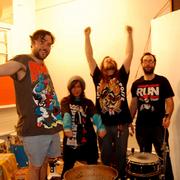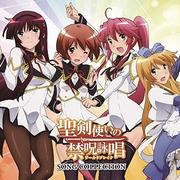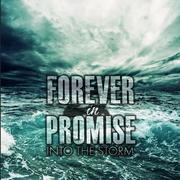Oomph!
| 基本信息 | |||
|---|---|---|---|
| 姓名 | Oomph! | 别名 | 暂无 |
| 国籍 | 出生地 | ||
| 语言 | 性别 | 组合 | |
| 生日 | 星座 | ||
| 身高 | 体重 | ||
Hailed as pioneers of the German "tanz metal" (dance metal) scene and heavily influencing late-'90s acts like Rammstein, Oomph! were arguably one of the most controversial, influential, and popular German goth-industrial bands to emerge in the early '90s. In spite of their importance to the German industrial scene, however, Oomph! didn't break into the mainstream until the early 2000s.
Frontman Dero Goi and guitarist Andreas Crap were born in Wolfsburg, Lower Saxony. The two grew up in the same tenement housing unit, and started playing music together when they were in grade school. Dero and Crap were playing in a new wave band by the time they met Robert Flux at a music festival in 1989. The three hit it off, and Oomph! were born. The band traveled to Spain that year and recorded a 500-copy demo. They managed to obtain a contract with Machinery once they returned to Germany; their first single on that label, a KMFDM-esque track called "Ich Bin Du," was released in 1991, and the following year found Oomph! with their self-titled debut.
Oomph! had yet to develop their guitar-driven metal sound -- they were more or less considered part of the electro scene -- but things changed on the band's next release, 1994's Sperm. It was aggressive, it was metal, and it was highly controversial; the video for the first single, "Sex," was banned from MTV Germany due to its graphic content. Oomph!'s third album, Defekt, was released the following year, and the band embarked on an exhaustive touring schedule. Two new members, Leo and Tobi, were added to round out the band's live sound, and a new music video, "Ice Coffin," made the rounds on MTV Germany. Oomph!'s profile had heightened to the point that they were offered a spot on Virgin Schallplatten's roster, but Dynamica (a subsidiary of Machinery) refused to let them go until they'd completed their fourth album. Grudgingly, the band fulfilled its contract with Wunschind in 1996.
Oomph! signed with Virgin the following year, and their fifth album, 1998's Unrein, peaked in the Top 50 on the German charts. The band's second Virgin release, Plastik, hit stores the following year. One of the album's singles, "Das Weisse Licht," peaked at number 46 on the German charts, and the video for this song, which depicted Dero tearing open his abdomen, was banned from MTV Germany due to its graphic nature. The album also featured Evanescence-style appearances by Nina Hagen. The band's final album on Virgin, Ego, was released in 2001. Critics gave the album lukewarm reviews, but Ego did well nonetheless, peaking in the German Top 20 and earning the band a tour with HIM. It wasn't good enough for Virgin, though, and they opted to drop Oomph! once their contract expired. Undaunted, Oomph! went on to play Ozzfest the following year and continued to write new material.
Gun/Supersonic signed Oomph! in late 2003, and the band's first single from 2004's Wahrheit Oder Pflicht, "Augen Auf!," hit stores and MTV Germany a few months later. It was a huge success, earning Oomph! their first number one hit and launching the band into the mainstream. "Augen Auf" was the number one song on the German charts for eight weeks, and its first printing nearly sold out within the first 12 hours of its release. The track eventually went on to be included on the FIFA 2005 soundtrack. Oomph!'s winning streak continued with their ninth studio release, 2006's GlaubeLiebeTod (FaithLoveDeath), which peaked in the German Top Ten. The first single from that album, "Gott Ist ein Popstar" (God is a Popstar), sparked considerable controversy when it was released; the band's performance at the ECHO Awards was canceled due to the questionable nature of the song, and many radio stations throughout Germany boycotted the track.
A couple best-of comps emerged in the wake of Oomph!'s mainstream success. Virgin Schallplatten released Best of Virgin Years: 1998-2001 in 2006. Oomph! urged their fans to refrain from purchasing that disc in lieu of Gun's "official" best-of, Delikatessen, which went on to be released in December of that year.
Frontman Dero Goi and guitarist Andreas Crap were born in Wolfsburg, Lower Saxony. The two grew up in the same tenement housing unit, and started playing music together when they were in grade school. Dero and Crap were playing in a new wave band by the time they met Robert Flux at a music festival in 1989. The three hit it off, and Oomph! were born. The band traveled to Spain that year and recorded a 500-copy demo. They managed to obtain a contract with Machinery once they returned to Germany; their first single on that label, a KMFDM-esque track called "Ich Bin Du," was released in 1991, and the following year found Oomph! with their self-titled debut.
Oomph! had yet to develop their guitar-driven metal sound -- they were more or less considered part of the electro scene -- but things changed on the band's next release, 1994's Sperm. It was aggressive, it was metal, and it was highly controversial; the video for the first single, "Sex," was banned from MTV Germany due to its graphic content. Oomph!'s third album, Defekt, was released the following year, and the band embarked on an exhaustive touring schedule. Two new members, Leo and Tobi, were added to round out the band's live sound, and a new music video, "Ice Coffin," made the rounds on MTV Germany. Oomph!'s profile had heightened to the point that they were offered a spot on Virgin Schallplatten's roster, but Dynamica (a subsidiary of Machinery) refused to let them go until they'd completed their fourth album. Grudgingly, the band fulfilled its contract with Wunschind in 1996.
Oomph! signed with Virgin the following year, and their fifth album, 1998's Unrein, peaked in the Top 50 on the German charts. The band's second Virgin release, Plastik, hit stores the following year. One of the album's singles, "Das Weisse Licht," peaked at number 46 on the German charts, and the video for this song, which depicted Dero tearing open his abdomen, was banned from MTV Germany due to its graphic nature. The album also featured Evanescence-style appearances by Nina Hagen. The band's final album on Virgin, Ego, was released in 2001. Critics gave the album lukewarm reviews, but Ego did well nonetheless, peaking in the German Top 20 and earning the band a tour with HIM. It wasn't good enough for Virgin, though, and they opted to drop Oomph! once their contract expired. Undaunted, Oomph! went on to play Ozzfest the following year and continued to write new material.
Gun/Supersonic signed Oomph! in late 2003, and the band's first single from 2004's Wahrheit Oder Pflicht, "Augen Auf!," hit stores and MTV Germany a few months later. It was a huge success, earning Oomph! their first number one hit and launching the band into the mainstream. "Augen Auf" was the number one song on the German charts for eight weeks, and its first printing nearly sold out within the first 12 hours of its release. The track eventually went on to be included on the FIFA 2005 soundtrack. Oomph!'s winning streak continued with their ninth studio release, 2006's GlaubeLiebeTod (FaithLoveDeath), which peaked in the German Top Ten. The first single from that album, "Gott Ist ein Popstar" (God is a Popstar), sparked considerable controversy when it was released; the band's performance at the ECHO Awards was canceled due to the questionable nature of the song, and many radio stations throughout Germany boycotted the track.
A couple best-of comps emerged in the wake of Oomph!'s mainstream success. Virgin Schallplatten released Best of Virgin Years: 1998-2001 in 2006. Oomph! urged their fans to refrain from purchasing that disc in lieu of Gun's "official" best-of, Delikatessen, which went on to be released in December of that year.
 加载评论内容,请稍等......
加载评论内容,请稍等......













